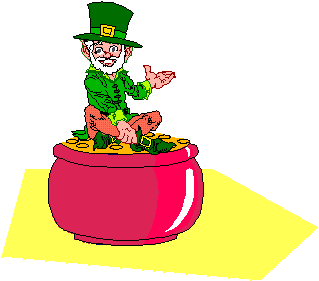 Another response to Fighting Sioux vs. Fighting Irish:
Another response to Fighting Sioux vs. Fighting Irish: Another response to Fighting Sioux vs. Fighting Irish:
Another response to Fighting Sioux vs. Fighting Irish:
Dear Rob,
What originally began as research on the Navajo for a story idea I have eventually became (in true surfing the internet fashion) immersion in your website's comparison between stereotypical sports teams' names -- specifically, how names depicting Native Americans as warriors are different from the Fighting Irish.
My main question had to do with an assertion you made frequently that I didn't see anyone else dispute, although it seemed the most obvious to me. Specifically:
Since when are the Irish not stereotyped as being fighters anymore?!?!?
*Ahem* As a descendant of the Irish, I bristle at that. Sure, the drinking stereotype is there too, but it's now and always in conjunction with fighting. (Hence the song, "Drink and Fight"!) Look at any recent popular movies that specifically feature Irish: Boondock Saints, Snatch, Gangs of New York. The popular view even now of the Irish is of good-natured, feisty, underdog bare-knuckle boxers who will start a brawl at the drop of a hat and, after knocking you down, pick you up again and buy you a drink. No less stereotypical, no less unrepresentative of the culture as a whole -- but the difference, I guess, is that most Irish (even those who, like me, have never been in a fistfight in our lives) have embraced that stereotype and made it our own, taking a perverse pride in the image we have in popular culture.
I have a feeling, also, that that's part of why the Irish have mostly lost their 2nd-class status. I do sympathize with the efforts of the Native Americans who don't think the Seminole Chop is good form, but insisting on respect in that fashion rarely works. If it does anything at all, it creates a show of respect while breeding resentment among those who think to themselves "Damn, that was a fun chant to sing until those whiners spoiled our fun." I'm just saying that the efforts in this area may in fact be counterproductive.
Wishing to write more but also eager to leave my desk and go home,
Kristy
Rob's reply
Kristy,
I'd say the "fighting and drinking" Irish stereotypes are pretty muted these days. Ronald Reagan, John F. Kennedy, Sandra Day O'Connor, Daniel Moynihan, Liam Neeson, Conan O'Brien, Tom Clancy...nobody thinks of these people as either fighters or drinkers.
Here's a list of some famous Irish celebrities:
Bing Crosby, Spencer Tracy, Maureen O'Hara, Grace Kelly, Burt Lancaster, Gregory Peck, Jack Lemmon, Mia Farrow, Art Carney, Carroll O'Connor, Shirley Maclaine, Mary Tyler Moore, Warren Beatty, Robert Redford, Angelica Huston, George Clooney, Bill Murray, Rosie O'Donnell, Kevin Kline, Dennis Leary, Bill Maher, Aidan Quinn, Martin Sheen.
Are they known primarily or even secondarily as fighters or drinkers? Well, no.
Occasionally you do think of someone who's a fighter or a drinker: James Cagney, Mickey Rourke, Ted Kennedy. But that raises a couple questions. The first is whether fighters or drinkers occur as a greater percentage of the Irish population than the general population. Because the non-Irish population has its fair share of fighters and drinkers too, of course.
The second is whether the fighters and drinkers come from the present generation or a previous generation. I mean, the stereotypical Irish cop on the beat, played by someone like Cagney, is 50 or 75 years old if it's a day. Unless the story is set in Boston, how often is today's TV or movie cop stereotypically Irish?
Let's look at the rough numbers. Out of a thousand Irish appearances in the media, how many involve fighters or drinkers. Ten? Twenty? Fifty? Whatever the number, it's pretty small.
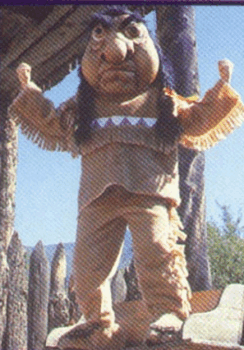
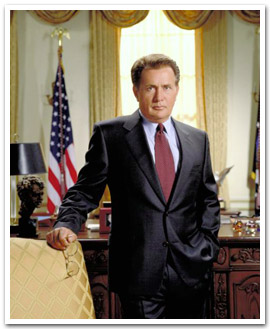
Now consider Indian appearances in the media. Out of a thousand appearances, maybe 800 are Indians as sports team logos. Another 180 may be Indians as greedy or insensitive casino owners. Another 15 may be Indians as touchy-feely artists or craftsmen. The last five are Indians in all other roles: intellectuals, executives, lawyers, doctors, engineers, etc., etc.
In short, the problems aren't comparable. They may have been more comparable in the 19th and (early) 20th centuries. But over time, I believe, the Irish spoke up against being portrayed as drinkers and fighters. As a result, these portrayals have fallen by the wayside.
>> Look at any recent popular movies that specifically feature Irish: Boondock Saints, Snatch, Gangs of New York. <<
Gangs of New York was a historical drama, of course. I don't know the other two movies. I'm guessing they weren't blockbusters and didn't have much impact on the cultural consciousness.
>> The popular view even now of the Irish is of good-natured, feisty, underdog bare-knuckle boxers who will start a brawl at the drop of a hat and, after knocking you down, pick you up again and buy you a drink. <<
If people were to identify what the Irish are like, that probably would be the view. The question is how much this comes into play in reality. People of Irish descent are everywhere, at all levels of society. They are us, more or less. People don't assume they're all fighters or drinkers.
Irish have embraced "fighing"?
>> No less stereotypical, no less unrepresentative of the culture as a whole -- but the difference, I guess, is that most Irish (even those who, like me, have never been in a fistfight in our lives) have embraced that stereotype and made it our own, taking a perverse pride in the image we have in popular culture. <<
I've read articles complaining about Irish, Italian, Jewish, and Arab stereotypes. I don't recall any articles that embraced these cultural stereotypes. So I don't agree with your premise that the Irish have "embraced" the fighting stereotype. I'd say it's faded to some degree because people have protested it, or at least grown sensitive to it.
Moreover, as I've said, the Irish (along with other WASPish ethnic groups) are the ones in power. They can embrace at their stereotypes because these stereotypes don't affect their power. White people in general and white males in particular can shrug off satire or mockery; they can figuratively or literally laugh all the way to the bank.
Besides, fighting isn't necessarily a bad trait. It's arguably a good trait if you're the one in power. You fight for what you believe in and all that. It's only bad if it's an uni-dimensional trait, as it is the the case of Indians.
Stereotypically speaking, the Irish are known as more than fighters or drinkers. They're also known as poets, lovers, Catholics, and saints (e.g., St. Patrick). The Indian case is far different.
As I explained in Smashing People: The "honor" of Being an Athlete, being thought of as a warrior is no great thing. Because people view Indians solely as warriors (sports mascots), they treat them as less than human. A warrior is a savage is a predator is a killer is an animal, so the (subliminal) thinking goes.
>> I have a feeling, also, that that's part of why the Irish have mostly lost their 2nd-class status. <<
Indians have largely embraced the "warrior" stereotype. Whenever they talk about a Native issue—whether it's gaming or health care or civil rights—you hear about Indian "warriors" fighting for their people. That may be why they don't protest mascots as much as they could.
But I'm not sure if this embrace has helped them. True, it may have bolstered their pride and self-esteem through their dark and turbulent history. But it also may have marginalized them as less than full-fledged members of society. It may have kept them "on the reservation" and in the history books, so to speak.
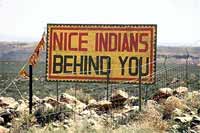
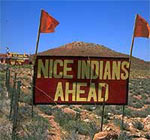
>> I do sympathize with the efforts of the Native Americans who don't think the Seminole Chop is good form, but insisting on respect in that fashion rarely works. <<
Yes, well, I haven't taken a position on the best way to protest these practices. But you don't see me (or many activists) marching or carrying signs. I'm "protesting" by writing up the stereotypes and posting them as educational tools. People can decide for themselves if they're doing something wrong and need to change their attitudes.
>> If it does anything at all, it creates a show of respect while breeding resentment among those who think to themselves "Damn, that was a fun chant to sing until those whiners spoiled our fun." I'm just saying that the efforts in this area may in fact be counterproductive. <<
A lot of activists present reasoned arguments and petitions to school leaders and ask them to consider the evidence. They don't shout at or insult the fans in the stands. When someone burns a Chief Wahoo figure outside the Cleveland Indians stadium, it's newsworthy because something that confrontational so rarely happens.
I don't know if we should congratulate or criticize activists for taking a calm, measured approach. Whatever works is my philosophy, but I'm not sure this works. School leaders rarely concede anything unless they're dragged kicking and screaming to the negotiating table. They're reluctant to go against alumni for any reason. Indians may need to protest loudly and proudly to show how deeply they're offended.
Rob
Related links
Team names and mascots
|
. . . |

|
All material © copyright its original owners, except where noted.
Original text and pictures © copyright 2007 by Robert Schmidt.
Copyrighted material is posted under the Fair Use provision of the Copyright Act,
which allows copying for nonprofit educational uses including criticism and commentary.
Comments sent to the publisher become the property of Blue Corn Comics
and may be used in other postings without permission.